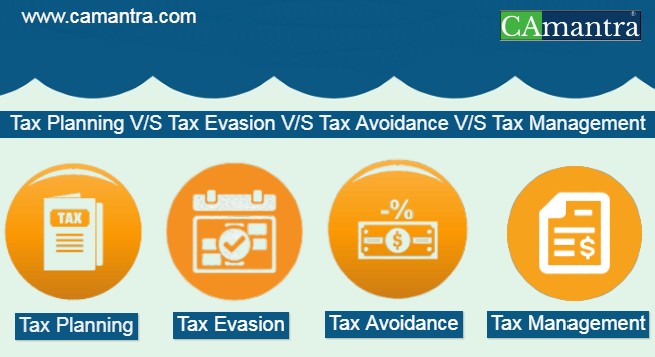Tax planning, Tax evasion, Tax avoidance and Tax management are common concept when it comes to taxpayers’ manners for tax reduction. All terms comes under Income Tax Act, 1961– Tax Planning, Tax Evasion, Tax Avoidance and Tax Management.
The main goal of every taxpayer is to minimize his/her Tax Liability. To achieve this objective taxpayer can go for these Three Methods:
- Tax Planning
- Tax Avoidance
- Tax Evasion
Tax Planning
Tax Planning is a process of planning in order to avail all exemptions, deductions and rebates provided in Act. The Income Tax law provides various methods for Tax Planning, usually it is provided under exemptions under section 10, deductions under section 80C to 80U and rebates and relief’s.
Some of the provisions are mentioned below:
- Investment in securities provided under section 10(15). on such securities interest is fully exempt from tax.
- Exemptions under section 10A, 10B, and 10BA
- Residential Status of the person
- Choice of accounting system
- Choice of organization.
Where a person buys machinery instead of hiring it, he/she is availing the benefit of depreciation. If his/her exclusive right either to buy or lease it. In the same manner to choice the organization structure, capital structure, buys or make products are the assesse’s exclusive right. One may look for numerous tax incentives in the above said transactions provided in this Act, for reduction of tax liability. All these transactions involve tax planning.
Tax Planning leads to reducing tax liability by taking benefit of the legitimate concessions & exemptions provided in the tax law. It gives you the way to process of arranging business operations in such a way that reduces tax liability.
It is counted as the procedure of elaborating the financial related matters of company to enhance the tax benefits under eligible provisions of the tax framework. The planning assists taxpayers to lessen their tax liability through a variety of means, namely deductions, credits, rebates and exemptions provided under the Income Tax Act or the corresponding tax laws.
For Example:-
1. Investments u/s 80C which is payment related deductions,
2. U/s section 80CCD which is contribution to Pension Fund of LIC or other insurance company
3. Reinvestment u/s 54, 54EC etc.
2) Tax Evasion
Tax evasion is any illegal method which is used to reduce tax liability of taxpayers. It is hugely attached to techniques or unlawful practices which results in showing fewer profits to minimize the individual or company’s tax burden.
In simple words, Tax Evasion is using illegal means to avoid paying taxes and it usually involves hiding or misrepresenting income. This might be inflating deductions without proof, not reporting or hiding of cash transactions, underreporting income, or hiding money in offshore accounts.
Tax evasion is part of definition of tax fraud, which is illegal intentional for non-payment of income taxes. You can define tax evasion as “an act of misrepresenting or deceiving ”. It is not legally permissible under taxing statue.
For Example:-
1. Bogus Expense
2. Underreporting of Income
3. Inflating deductions without proof
4. Not reporting cash transactions or hiding cash transactions, or hiding money in offshore accounts etc.
The Tax Evasion will be done by applying following means:
- Concealing the Income
- Claiming excessive expenditure
- Falsification of accounts.
- Willful violence of Rules
Tax Avoidance
Tax avoidance is an activity of taking unfair benefit of the shortcomings in the income tax rules by finding new ways to avoid the payment of taxes that are within the limits. Usually, it is done by twisting or interpreting the provision of law and avoiding payment of tax.
Tax avoidance can be done by adjusting the accounts in such a manner which shown that there will be no tax rules violation. Tax avoidance is lawful but in some scenario it could come in the category of unethical things or crime. It is the act of minimizing tax liability within the limits of the law or without breaking the law.
For Example:-
1. Taking legal tax deductions to abbreviate business expenses and lower your business tax bill.
2. Taking tax credits by spending money for legal purposes etc.
In other words, it is an act of dodging income tax without breaking the Law. It means when a taxpayer arranges his/her financial activities in such a manner that although it is within the four corner of tax law but takes benefits of loopholes which exists in the Tax Law for reduction of tax liability.
These transactions are held as Tax Avoidance which are:
- Where the fact of the case is presented in a false manner.
- Where the motto behind the law is avoided.
- There is a malafide intention.
It means that procedure adopted for tax liability reduction should be within the framework of law. If it is not comes under the framework of law, it amounts to tax avoidance and not Tax planning.
4. Tax Management
It means planning tax affairs in such a way, so that the tax obligation is managed properly. The main motto of Tax Management is to comply with the provisions of Income Tax Law and its allied rules. Tax Management helps in avoiding penalty, prosecution and payment of interest etc.
For Example:-
- Tax Management deals with filing of ITR in time.
- Getting the accounts audited.
- Deducting tax at source etc.
Know the Differences Between Tax Planning, Tax Evasion and Tax Avoidance
| Tax Evasion | Tax Avoidance | Tax Planning | |
| Purpose | Not paying tax | Minimizing Tax | Ensure Tax Efficiency |
| Legality | Illegal | Legal | Legal |
| Nature | Employ Illegitimate means | Avail Loophole in Law | Use the law to reduce tax liability |
| Exercise | Done after the tax liability | Done before the tax liability | Done before the tax liability |
| Impact | Penalty for imprisonment | Penalty for imprisonment | – |

